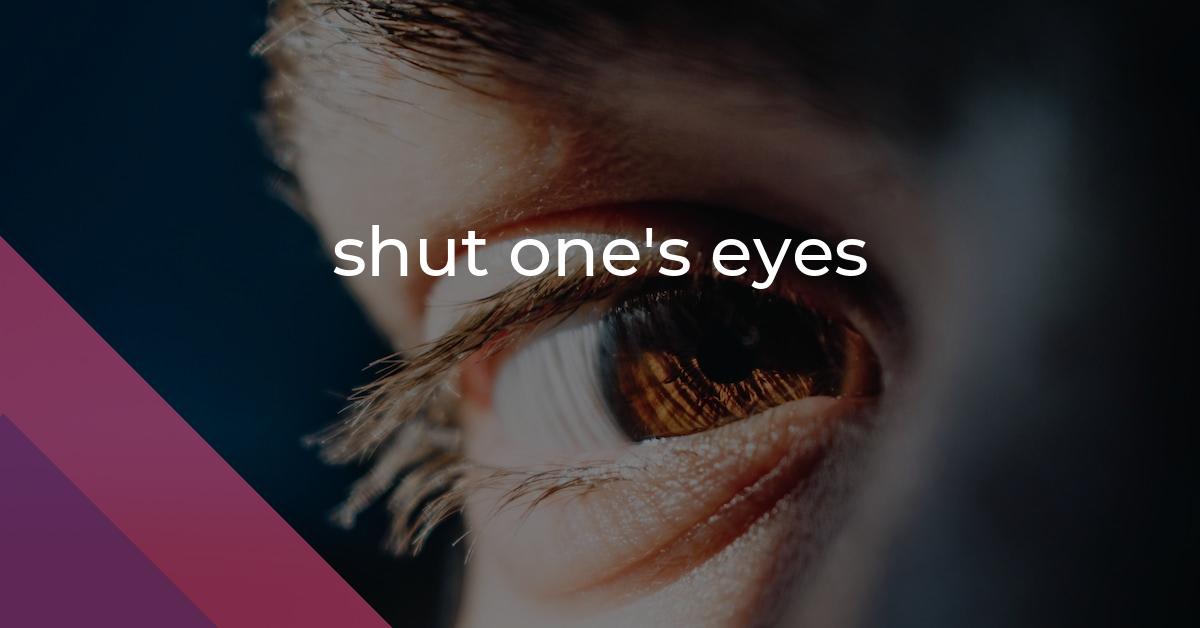shut one’s eyes: Idiom Meaning and Origin
What does ‘shut one's eyes’ mean?
The idiom "shut one's eyes" means to consciously ignore or disregard something, often a problem or truth, by refusing to see or acknowledge it.

Idiom Explorer
The idiom "take one's eye off the ball" means to lose focus or become distracted from an important task or goal.
The idiom "take no notice of" means to ignore or pay no attention to something or someone. It implies a deliberate act of not acknowledging or responding to a particular situation, remark, or individual.
The idiom "switch off" means to lose interest or become disengaged from something mentally or emotionally, often resulting in a lack of attention or focus.
The idiom "sweep something under the rug" means to hide or ignore a problem or mistake instead of dealing with it openly.
The idiom "suspend one's disbelief" means to temporarily accept something as true or real, even though it may be unlikely or not based in reality.
The idiom "stick one's head in the sand" means to ignore or refuse to acknowledge a problem or unpleasant situation, often out of fear or denial.
The idiom "stare someone in the face" means to confront or face a difficult or uncomfortable truth directly, without avoiding it. It implies looking someone or something directly in the eye, without flinching or turning away.
The idiom "sneeze on the truth" means to disregard or disrespect the truth by dismissing it or treating it as unimportant.
The idiom "sleep" means to rest or be in a state of unconsciousness, usually at night, when the body and mind rejuvenate.
Hidden Revelations
The idiom "shut one's eyes" is a commonly used phrase in English that has a figurative meaning. It refers to the act of closing one's eyes tightly or intentionally not looking at something, but it is often used in a metaphorical sense to describe the willful ignorance or deliberate avoidance of a particular truth, issue, or reality.
One of the interesting aspects of this idiom is its relationship to other idioms that involve closing or shutting certain body parts. For example, the idiom "close one's eyes" is similar to "shut one's eyes" and is often used interchangeably. Both idioms convey the idea of intentionally not looking at something or choosing to ignore a particular truth or reality. They can be used in various contexts to describe situations where individuals choose to turn a blind eye to something.
Similarly, the idiom "close one eye" is related to "shut one's eyes" and conveys a similar meaning. It suggests that someone is intentionally ignoring or not paying attention to a certain aspect of a situation. It can be used to describe situations where individuals choose to overlook or pretend not to notice something for their own benefit or convenience.
Another related idiom is "close one's mind," which is often used in conjunction with "shut one's eyes" to emphasize the aspect of deliberate ignorance or avoidance. When someone "closes their mind," they are willfully refusing to consider or entertain certain ideas or perspectives. This can be seen as a more broad or comprehensive version of "shutting one's eyes," as it involves not only ignoring specific facts or realities but also being closed off to new information or alternative viewpoints.
Furthermore, there are idioms that involve shutting or closing one's mouth or face, which are also related to the concept of "shutting one's eyes." The idiom "shut one's face" is often used as a more informal or slang version of "shut one's mouth." Both idioms convey the idea of someone being silent or refusing to speak, often in response to being told or shown something that they do not wish to acknowledge or address. These idioms can be used to describe situations where individuals choose to remain silent or avoid discussing certain topics or issues.
The idiom "shut one's eyes" has a long history and has been used in various contexts to describe the act of willful ignorance or deliberate avoidance. It offers insight into human behavior and the complex ways in which individuals navigate the complexities of life. Whether used in a negative or positive context, it serves as a reminder of the choices we make in acknowledging or ignoring certain truths or realities.
Example usage
Examples of how the idiom "shut one's eyes" can be used in a sentence:
- He shut his eyes and pretended not to see his friend stealing the candy.
- Despite the evidence, she chose to shut her eyes to her husband's dishonesty.
- The CEO shut his eyes to the unethical practices happening within the company.
More "Expression" idioms



